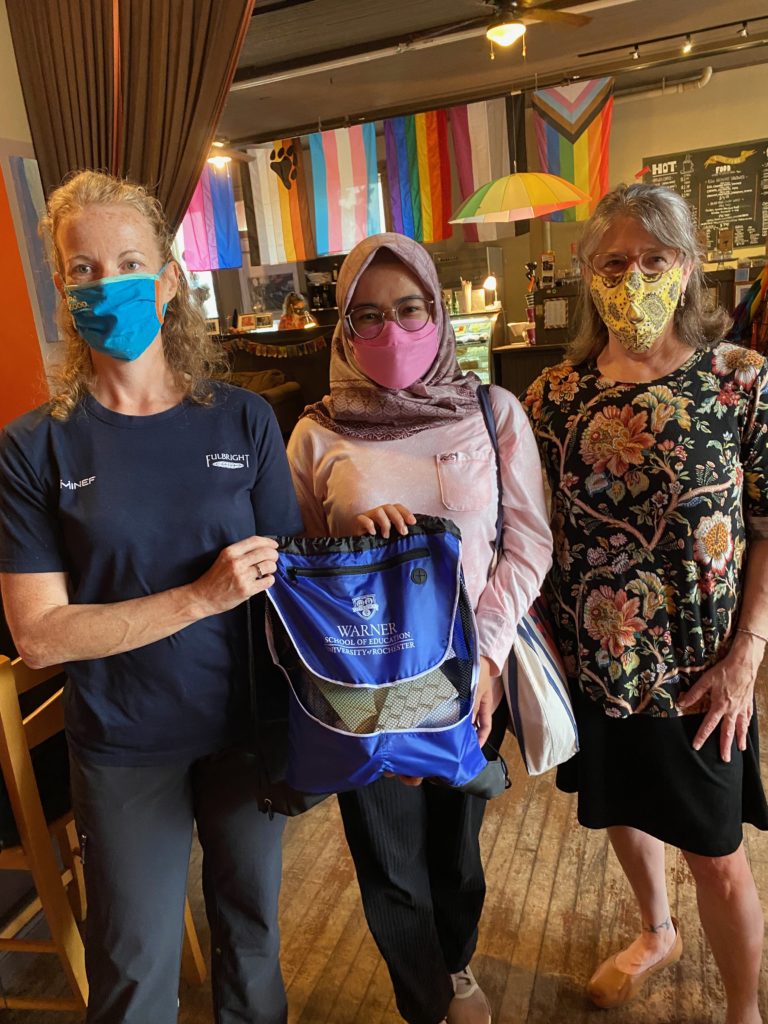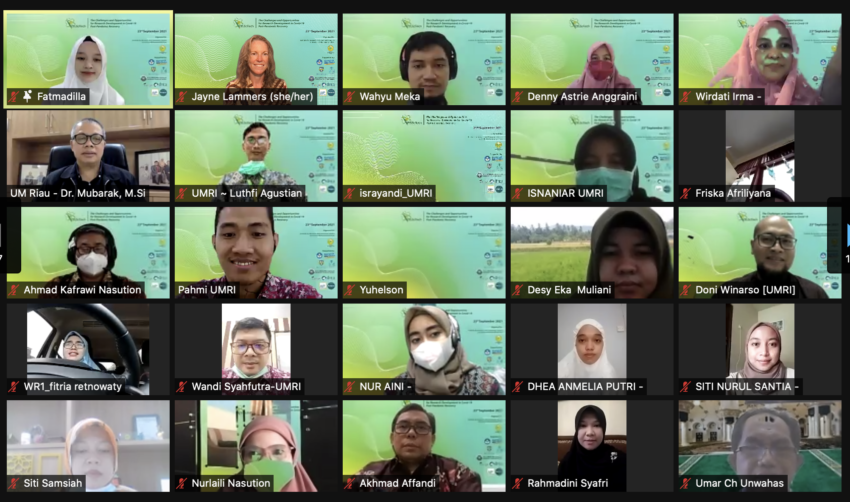As I draft this post, education and life remain disrupted by COVID-19, right now mostly due to the rapidly spreading omicron variant. The University of Rochester’s spring semester has been moved online to help slow the spread in Monroe County, where the 7-day average for new cases has continued to climb to numbers we’ve not seen in this pandemic (1,629 on January 9th, according to NY Times data)! This would have been my first opportunity to return to face-to-face teaching in LeChase Hall since June 2019 before I left for Indonesia. That time will come, just not yet. 🤷♀️

Simultaneously, Facebook shares with me daily reminders of where I was two years ago, showing me photographic memories of my travel adventures, the work I was privileged to experience at UNNES and around Indonesia, and the friends and professional connections I made. These daily reminders spark bittersweet joy as I review them and think about where and who I was at the time I crafted those posts. While none fully capture the experience, they do well to help me stay connected not only to the people and places that were part of my Fulbright adventure, but also to remind me of the importance of the work that stems from my time in Semarang. They show how much I appreciate travel as a means of exposing me to the richness of the world in the similarity and diversity of other parts of the globe. Most importantly, these social media memories stoke the embers of passion for what Puji and I talked about accomplishing as a result of our research, workshops, and writing camps.
Though the COVID-19 pandemic disrupted my plans to return to Indonesia in June 2020, and have distracted me from tending to the 🔥that ignited during my time abroad, the work has continued. Here are three primary ways:
Publications:
“We invite others to join us as we create a significant shift, a global turn, in digital literacies research as educators, researchers, and students from the north, south, east, and west learn in dialogue with one another to deepen global connectedness.”
(Lammers & Astuti, 2021, p. 377)
- In early 2021, the Journal of Adolescent & Adult Literacy published a commentary that Puji and I wrote in which we used our experience of researching together in Indonesia to call for a “global turn in digital literacies research.” [The full article is available at that link – thanks ILA!] We shared preliminary insights from our data as an opportunity “to reframe how literacy researchers and educators attend to the implications of increasing local diversity and global connectedness” (p. 373). This publication fulfilled the agreement of the Fulbright that we have a co-authored piece from the research. More importantly, this article signals the beginning of a shift for both of our scholarship – mine towards embodying the #globalacademic identity, discovering what it means to learn about literacy in other cultures and then share it with the field to inform inclusive global theory and education; Puji’s towards embodying the digital literacy scholar identity, exploring how to put localized practice in conversation with theories that have already been so influential in western contexts. For us, this commentary was quite a big deal, and we’re glad that it’s out there for others to read and engage with.
- Puji has also encouraged us and supported me in writing for Indonesian outlets, in bahasa Indonesia. That’s been a fun adventure! She wanted us to write for a local newspaper that she likes to contribute to: Suara Merdeka. So we drafted a short news article, making the argument that much of the content on social media is aimed at getting “likes”, rather than contributing to the Indonesian government’s ideology of Pancasila, which encourages Indonesians to stand for: belief in God, Indonesian nationalism, humanitarianism or just and civilized humanity, democracy, and social justice. I thought we did good job of trying to encourage social media content creators to follow 5 steps for producing and sharing online content that avoids some of the negative aspects of technology that worried our research participants, namely bullying and spreading “fake news.” However, that piece didn’t get published because they weren’t open to work from co-authors, and Puji and I are a team! 😉
- So, we reworked that draft to teach critical media literacy concepts to the public for a venue that reaches a wider audience. In October we had an article published on The Conversation – Indonesia, in which we introduce the concept of “digital citizenship.” In the piece, we argue that YouTube and other social media content creators have an opportunity, and even a responsibility, to contribute to the well-being and humanizing of society. We critique articles and other resources aimed at content creators that encourage playing into the “attention economy” by producing negative, dehumanizing content and instead offer insights from Burnett and Merchant’s conceptualization of critical literacy in a digital age. As of this post, our article has been viewed more than 2000 times! 🌱🌱🌱
It’s always a challenge to communicate research and theory to a broader public audience, and these publications had the extra challenge of working with Google Translate and figuring out how to communicate theoretical ideas we both understand and learned in English into her native language. I’m grateful to have Puji as a partner in this work, and am glad that she keeps suggesting that we take on these challenges.
This semester, we will be working with Warner School research assistant/apprentices to continue working with our research data as we prepare manuscripts for Indonesian academic journals, with the goal to submit one article containing an analysis of youth’s concerns and ideas about addressing hoaxes on social media and another highlighting cases of Indonesians as “global meaning makers.” More on these ideas later!
Presentations:

with an optimistic title signaling hope for when we actually do enter “post-COVID” times.
Though I had hoped to return to Java in June 2020 so that Puji and I could conduct workshops that we were unable to fit into our limited time during my Fulbright grant, this work also continues virtually. In April 2021, we spoke about our work together as part of a “New Literacy Studies Forum” that brings Indonesian scholars together to talk about this approach to research. If you’re interested, the YouTube recording is available here.
I have also facilitated virtual workshops hosted by AIFIS, AMINEF, and Indonesian universities and delivered keynote addresses to Indonesian audiences at the following conferences:
- 6th International Conference on Science, Education, and Technology, UNNES, Semarang, Indonesia. (2020, September 9)
- 7th Language and Language Teaching Conference, Sanata Dharma University, Yogyakarta, Indonesia. (2021, September 17)
- CELSciTech International Conference, Universitas Muhammadiyah Riau, Pekanbaru, Indonesia. (2021, September 23)
I also shared findings from the Fulbright research with other international audiences, as part of a panel of global literacy scholars I organized for the 2021 American Educational Research Association Annual Conference in April, and in a talk hosted by the Lancaster Literacy Research Centre, Lancaster University, U.K. on November 12, 2021.
Each time I present on our work, another seed is planted and the fire gets tended. When I share with international audiences, I see how this works matters to them and am reminded about why it’s important to share perspectives from less heard from regions, like Indonesia, with scholars and educators more broadly.

Supporting Indonesian Scholars:
The University of Rochester has a large and vibrant international student population, and lots of support for global initiatives in research, teaching, and learning. And in part due to my and others’ involvement in research back in Indonesia, we appear on a Ministry list of institutions of higher education where Indonesians who have government funding can pursue their degrees abroad. As a result, we now have many Indonesian graduate students at the Warner School. I’ve had many of them in my courses, connected with applicants at admissions events, and I’m advising a second-year Ph.D. student from North Maluku (Ismet) who is studying English language learning in digital gaming communities. Ismet is also one my research team apprentices, helping to support getting the Fulbright research disseminated.
Here’s something else that my time in Indonesia taught me – there’s a tight network of teacher educators and scholars who have benefitted from government funding to pursue higher education abroad and these scholars stay connected with each other. I saw this in how so many invitations to speak at universities in Indonesia came from Puji’s friends from her Master’s degree there and her Fulbright connections in the U.S. It also led to my agreement to sponsor a Fulbright Visiting Scholar – Dr. Dewi Elmiana from Universitas Mataram. You see, Dewi earned her Ph.D. at the University of Belfast, and was there when Isemt was earning his Master’s degree! They stayed connected and it was his suggestion that she reach out to me to serve as her host. Despite all of the COVID complications, Dewi was able to safely arrive in Rochester in August 2021 and had the opportunity to audit courses that have expanded her understanding of literacy, designing qualitative research, and the globalization of Englishes. As pictured here, she was also able to participate in our Warner writing community. She’s a member of my academic family, participating in monthly advising meetings and conducting exploratory research with others in that family. Dewi also receives feedback on her research project studying the use of images in Indonesian English language textbooks from me and my colleague Nancy Ares, acting as a co-host with me. This has been a truly enriching exchange for all of us involved. And, true to the spirit of Fulbright exchanges, we’re hoping the relationship continues as Dewi and I collaborate to bring me to her university once it’s again safe to travel abroad so that I may offer my expertise in digital literacy, research methodology, and academic writing support – in much the same way as I did at UNNES.
Back in May of last year, Puji sent me a WhatsApp message saying: “I miss reading your blog posts! Please write again soon 💚” Ever the source of wisdom and always true to values of Meliora and Fulbright, she offered more encouragement saying that these entries “are great sources for global academics 🌱building mutual understanding.”
As we enter year 3 of this pandemic, and the calendar turns to another year, I hope to resume the practice of blogging as a means of furthering my #globalacademic work. I’m planning to share more of the ways that my time in Indonesia has impacted my scholarship and teaching, and using this venue as a space to cultivate, tend to, and spread the seeds stemming from our research. 🌱🌱🌱
